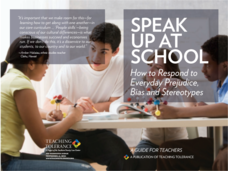Southern Poverty Law Center
Choosing Reliable Sources
It is more important than ever that 21st-century learners develop the skills they need to become savvy consumers of media. Young learners locate and identify reliable sources of information with a helpful media lesson.
Southern Poverty Law Center
Analyzing Gender Stereotypes in Media
Why might toy advertisers use gender stereotypes to sell their products? Young people think critically about media messages and its role in gender stereotyping with a thought-provoking instructional activity.
Southern Poverty Law Center
Evaluating Reliable Sources
A lesson plan instills the importance of locating reliable sources. Scholars are challenged to locate digital sources, analyze their reliability, search for any bias, and identify frequently found problems that make a source unusable.
Southern Poverty Law Center
Teaching Hard History: A Framework for Teaching American Slavery
Pupils investigate American slavery from colonial times through the Civil War. They incorporate primary sources, video clips, and firsthand accounts to understand how the slavery issue gripped the nation. Essays, presentations, and...
Southern Poverty Law Center
Analyzing How Words Communicate Bias
Words are powerful ... can your class choose them wisely? Scholars evaluate news articles to discover the concepts of tone, charge, and bias during a media literacy lesson. The resource focuses on recognizing implicit information and...
Southern Poverty Law Center
Evaluating Online Sources
All sources are pretty much the same, right? If this is how your class views the sources they use for writing or research projects, present them with a media literacy lesson on smart source evaluation. Groups examine several articles,...
Southern Poverty Law Center
Speak Up at School
When someone says something offensive based on prejudice or a stereotype, it's often difficult to know how to react. A packet on tolerance and standing up for others guides teachers to both learn and instruct members of their class to...








